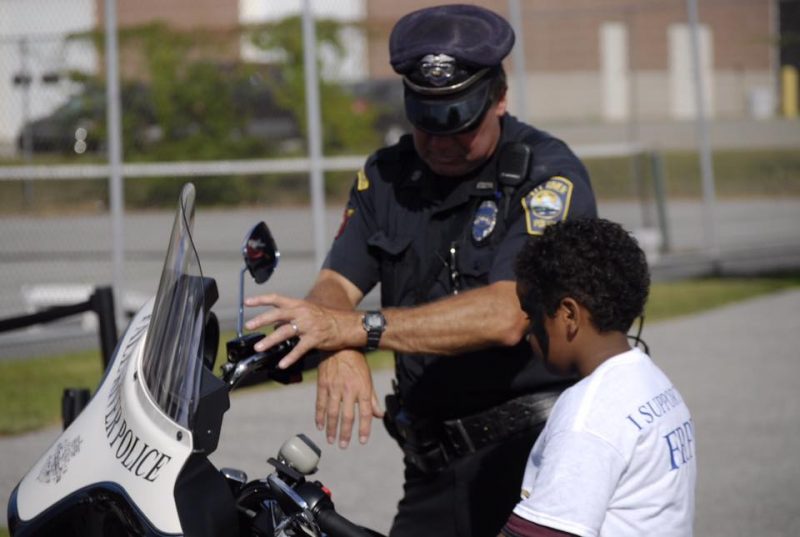latest
Six lawmakers named to draft final Massachusetts policing bill

Katie Lannan
State House News Service
Three senators who helped craft their branch’s policing bill will join the Judiciary Committee’s House chair, the head of the Massachusetts Black and Latino Legislative Caucus and a former state trooper on a conference committee that will try to reach a House-Senate compromise on police reform.
Each branch named its negotiators on Monday. On the Senate side, it’s Democrats Sen. William Brownsberger of Belmont and Sen. Sonia Chang-Diaz of Jamaica Plain, and Minority Leader Bruce Tarr, a Gloucester Republican.
The House appointed Rep. Claire Cronin, an Easton Democrat who as co-chair of the Judiciary Committee led the House’s effort to compile a police reform bill; Springfield Democrat Rep. Carlos Gonzalez, who chairs the Black and Latino Legislative Caucus, and Rep. Timothy Whelan, a Brewster Republican who voted against the bill.
Chang-Diaz, the sole member of the Black and Latino Caucus in the Senate, and Brownsberger chaired the working group that developed the Senate’s bill. Tarr was the only Republican on that panel.
Brownsberger and Cronin played leading roles in negotiations on a criminal justice reform package. Those talks lasted for 113 days. The police reform conferees have a much tighter timeline — Friday marks the last day of formal legislative sessions for the two-year term, though there is a possibility that lawmakers could agree to work beyond that deadline because of the disruptions of the COVID-19 pandemic.
Protests across Massachusetts and the country in response to police killings of unarmed Black Americans, including George Floyd in Minneapolis, catapulted the issues of law enforcement accountability and racial justice onto Beacon Hill’s agenda.
The Black and Latino Caucus on June 2 put out a reform plan that included four-state level action items — creation of a certification and decertification system for law enforcement officers, establishment of clear and uniform limits on excessive force and a duty to intervene, a commission for comprehensive civil service review, and a commission on structural racism. In a statement Monday, the caucus said all four of those ideas were included in the House bill.
“With this bill we take a step to rise above the fray of our shared dark past across the country and here in Massachusetts,” Rep. Nika Elugardo, a member of the caucus and Boston Democrat, said before the House’s final vote Friday. “This bill is an important beginning not because the ink on this page is beautiful or comprehensive or complete or even entirely fair. This bill is a beginning because of how we came together to create it, not without flaws or lapses of judgement — I myself have gotten caught up in the tension more than once — but we brought this bill through the tears, the smears, the fears, we’ve exchanged lobs and jeers at one another. Through our individual issues with race, through our anger and our concerns, we found a way to share values.”
Gov. Charlie Baker, House Speaker Robert DeLeo and Senate President Karen Spilka have all said they want to see a policing bill completed by July 31, the day legislative rules set as the end of formal lawmaking business. Spilka and DeLeo have separately suggested the possibility of extending the session if major issues are not resolved in the next few days, though no specific plan for doing so has been put forward and agreed to.
Both versions of the police reform bills create new commissions that would certify police officers and de-certify those who have committed misconduct, though the structures differ. The House and Senate also diverged in their approaches to limiting qualified immunity that shields police officers from civil lawsuits.
As the six lawmakers seek to reach consensus, they’ll be dealing with legislation that prompted a range of opinions, and some decisions made on votes that were tighter than is often typical on Beacon Hill.
The Senate passed its bill (S 2820) in the early morning hours of July 14, on a 30-7 vote. After three days of debate, the House voted 93-66 to pass its bill (H 4860) Friday night. No Republican lawmaker in either branch voted for the bills — Tarr and Sen. Patrick O’Connor voted present, and all other Republicans opposed it.
The vote margins indicate it would be difficult to finalize the bill in informal sessions, where unanimous consent is required to advance a bill. It’s also not clear at this point what Baker might think of whatever final version might reach his desk, where he’ll have the option to sign, veto or amend it.
Whelan, a former State Police trooper, said the original version the bill “had many holes in it” and that through the amendment process, representatives “installed more” holes than they’d filled. He said the bill “expanded by geometric proportions” beyond the “narrow focus” that law enforcement representatives had agreed to with the Black and Latino Caucus.
“We look at this bill that we have here today, it gravitated from those specific important points that we arrived at consensus on to now we have things included in here, they diminish the due process rights of the union sisters and brothers assigned to those unions representing police officers,” Whelan said. “It weakens their rights for arbitration. It clearly violates the constitutional double jeopardy protections. It significantly changes their working conditions without granting impact bargaining.”
Rep. Colleen Garry, a Dracut Democrat who represents a district along the New Hampshire border, said the bill could prompt current police officers to leave their jobs in Massachusetts. She said police treat her constituents with respect and deserve respect in return, and that the bill doesn’t give officers the benefit of the doubt.
“I’ll tell you this — the ones who are close to retirement are going to retire, because they’re not going to risk everything that they’ve worked hard for their entire career to have somebody bring a frivolous claim against them and the young ones, they’re already applying for jobs in New Hampshire,” she said.
Rep. Jack Lewis, who is white, said he has a Black son who is “six years away from driving and I already lose sleep from my inability to protect him,” and that his own worry is only a fraction of that experienced by parents of color, who have never been able to ignore the fear of police brutality. A Framingham Democrat who co-chairs the House Progressive Caucus, Lewis said he’s seen some police officers “use fear to achieve their objectives” over the last few weeks, by suggesting that qualified immunity reforms would lead to officers quitting “in droves” and losing their homes in “frivolous lawsuits.”
“I’ll never be able to experience the fear that people of color experience every day, but if the police use even a fraction of the fear tactics that they have used over these last several weeks … on individuals and communities of color, then I can only begin to imagine the deeply instilled fear and mistrust that the police must conjure,” Lewis said.
Last week, when the House released its bill, Spilka, Brownsberger and Chang-Diaz said they looked forward “to working towards a final, stronger version of this bill that combines the best of both to put more power in the hands of civilians, shift resources to the communities most impacted by overpolicing, and build a more equitable and just future.”
-

 Community6 years ago
Community6 years agoNational Shrine of La Salette Festival of Lights 2017 set to begin
-

 Community6 years ago
Community6 years agoMassachusetts State Police looking for good home for retired dogs
-

 Crime6 years ago
Crime6 years agoFall River ranked most dangerous city in Massachusetts according to report
-

 latest6 years ago
latest6 years agoDurfee student allegedly overdoses on marijuana
-

 Community6 years ago
Community6 years agoVideo of Fall River Police goes viral
-

 Causes6 years ago
Causes6 years agoMissing Fall River woman found deceased
-

 Crime6 years ago
Crime6 years agoFall River Police add names to most wanted list
-

 Causes6 years ago
Causes6 years agoFall River teenager reported missing has been found



